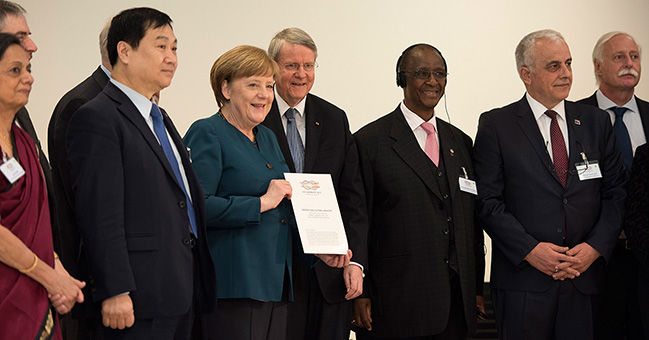S20 dialogue forum
Experts discuss global health
How can communicable and non-communicable diseases be combated effectively at global level? This is a key part of the G20 agenda. The Chancellor was presented with pertinent recommendations for action by the presidents of the G20 states’ national academies of sciences.
 The Chancellor was presented with the recommendations of the G20 academies of science for improving global health
Photo: Bundesregierung/Bergmann
The Chancellor was presented with the recommendations of the G20 academies of science for improving global health
Photo: Bundesregierung/Bergmann
Diseases – communicable and non-communicable – can wreak havoc around the world. Not only do they cause considerable suffering on the part of individuals and their families – they incur colossal costs. They are responsible for the loss of workers and for declining productivity and prosperity. "And that is why health is an issue that belongs on the G20 agenda," said Chancellor Angela Merkel in her speech at the S20 dialogue forum in Halle (Saale).
Within the G20 process, the dialogue forum with scientists is a premiere. "Science is a driver of globalisation, but science also benefits from globalisation," said Angela Merkel. She welcomed the fact that in their recommendations the scientists specifically say that furthering research is a prerequisite for providing knowledge and new tools to meet the challenges. She stressed that health, as discussed in Halle, is one of the most important sustainable development goals laid out in the United Nations’ 2030 Agenda for Sustainable Development.
Worldwide impacts
As the recent Ebola and Zika outbreaks have demonstrated, outbreaks of a disease in one country can impact on other countries around the world. It is thus important to improve preventive mechanisms and to stop ignoring the links between communicable and non-communicable diseases. Today, for instance, we know that 15 per cent of cancers are caused by infections. There is also a correlation between tuberculosis and type 2 diabetes.
Leading scientists from the G20 states met at the Leopoldina German National Academy of the Sciences in Halle (Saale) to discuss ways of improving global health care. The academy presidents looked in particular at public health measures including vaccinations, improving drinking water supplies and sanitation, and ensuring proper solid waste management.
Difficult living conditions, such as poverty and inequality are one crucial factor that stands in the way of achieving good health. Major risk factors include tobacco, alcohol and drug abuse and unhealthy life styles.
Recommendations for the G20
The experts drew up concrete recommendations in the following areas:
- Strengthening health care and public health systems and ensuring universal access
- Applying existing and emerging knowledge
- Taking into account social, environmental and economic determinants of health
- Reducing serious risk factors for disease and promoting healthy life styles
- Enhancing and extending robust strategies for surveillance and information-sharing.
The Chancellor thanked the academy presidents, who she described as "bridge builders in society" for the communiqué. "I hope that it has been an enriching experience for you," she said. "It certainly has been for us."
Wednesday, 22 March 2017

